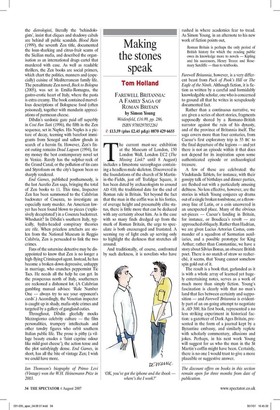Dark heart of the deep south
Ian Thomson END GAMES by Michael Dibdin Faber, £12.99, pp. 335, ISBN 9780571236152 © £10.39 (plus £2.45 p&p) 0870 429 6655 Last March, after an unexpected illness, Michael Dibdin died at his home in Seattle. His death came as a shock to fans everywhere of crime fiction. Dibdin had just turned 60. His Aurelio Zen mysteries are distinguished by their edgy, convincing police work, mordant dialogue and the picture they give of social unease and mayhem in Italy today. Inspector Zen, a Venice-born policeman, is portrayed as a sternly pensive slogger with health and marital problems, a sort of Mediterranean Inspector Rebus. From his debut in Rat King (1989), Zen was in a bad way. He smoked too much, drank excessively and fell into lugubrious talk of his (and Italy's) demise. Still he pushed on with his assignments, and retained a degree of disabused integrity, combined with a sardonic if occasionally malevolent wit.
Dibdin was born in Wolverhampton in 1947, the son of a Cambridge physicist and a nurse. The influence of Conan Doyle showed in his first crime fiction, published in the early 1980s while he taught English at the university of Perugia. A Rich Full Death (1987), set in 19th-century Florence, saw Robert Browning in the unlikely role of sleuth. The poet's Holmesian powers of deduction lead him down Tuscan backstreets in search of a killer. The novel, in spite of its strong period detail, remains a donnish caper.
To my knowledge, Dibdin was the first British novelist to show us the dark side of modern Italy. The Zen thrillers are, among other things, a corrective to those baleful `Toujours Tuscany' memoirs with their tone of elegiac mawkishness and overtures to sunsets and pasta-making. The Italy of the Zen books is a country whose time has passed. Behind the roseate flush of its postwar prosperity lies a corruption, where justice may not prevail. As an old-fashioned moralist, Zen bemoans the country's kickback and bribery culture, known as la bustarella (the little envelope'), and detects a deepening social malaise. Dibdin understood better than most the hidden forces and hoodlum financiers that motivate Europe's most foxy political class: the Italians.
In Italy, conspiracy theories abound: the dietrologisti, literally the `behindologists', insist that cliques and shadowy cabals are behind all public scandals. Blood Rain (1999), the seventh Zen title, documented the loan-sharking and citrus-fruit scams of the Sicilian mafia, and described the organisation as an international drugs cartel that murdered with ease. As well as readable thrillers, the Zen books are social primers, which chart the politics, manners and (especially) cuisine of Mediterranean family life. The penultimate Zen novel, Back to Bologna (2005), was set in Emilia-Romagna, the gastro-erotic heart of Italy, where the pasta is extra creamy. The book contained marvellous descriptions of Bolognese food (often poisoned), together with mandarin appreciations of parmesan cheese.
Dibdin's sardonic gaze paid off superbly in Cosi Fan Tutti (1996), the fifth in the Zen sequence, set in Naples. His Naples is a picture of decay, teeming with barefoot immigrants from Senegal and sallow ghouls in search of a heroin fa. However, Zen's finest outing remains Dead Lagoon (1994), for my money the best contemporary novel set in Venice. Rarely has the sulphur-reek of the Grand Canal, or the pollution of tin cans and Styrofoam on the city's lagoon been so sharply rendered.
End Games, published posthumously, is the last Aurelio Zen saga, bringing the total of Zen books to 11. This time, Inspector Zen has been summoned to the Calabrian backwater of Cosenza, to investigate an especially nasty murder. An American lawyer has been found blown to pieces (explosively decapitated') in a Cosenza backstreet. Whodunit? In Dibdin's southern Italy, typically, hydra-headed conspiracy theories are rife. When priceless artefacts are stolen from the National Museum in Reggio Calabria, Zen is persuaded to link the two crimes.
Fans of the saturnine detective may be disappointed to know that Zen is no longer a high-flying Criminapol agent. Instead, he has become a broken-down depressive, unhappy in marriage, who crunches peppermint Tic Tacs. He needs all the help he can get. In the prosperous north of Italy, southerners are reckoned a dishonest lot. (A Calabrian gambling manual advises: 'Rule Number One — always try to see your opponent's cards'.) Accordingly, the Venetian inspector is caught up in shady, mafia-style crimes and targeted by a gallery of gangland cuties.
Throughout, Dibdin gleefully mocks Mezzogiorno celebrity culture — the film personalities, trumpery intellectuals and other tawdry figures who orbit southern Italian public life. The prose is pithy (a village beauty exudes a 'faint caprine odour like mild goat cheese'), the action tense and the plot satisfyingly dense. End Games, in short, has all the bite of vintage Zen; I wish we could have more.
Ian Thomson 's biography of Primo Levi (Vintage) won the W H. Heinemann Prize in 2003.









































 Previous page
Previous page